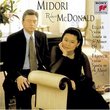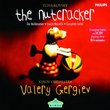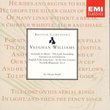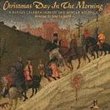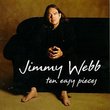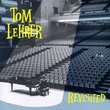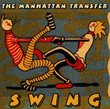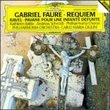| All Artists: Gerald Finzi, Howard Griffiths, Northern Sinfonia Chorus, Peter Donohoe Title: Finzi: Cello Concerto; Grand Fantasia & Toccata; Eclogue Members Wishing: 1 Total Copies: 0 Label: Naxos Release Date: 11/20/2001 Genre: Classical Styles: Chamber Music, Forms & Genres, Concertos, Historical Periods, Classical (c.1770-1830), Instruments, Keyboard, Strings Number of Discs: 1 SwapaCD Credits: 1 UPC: 747313576623 |
Search - Gerald Finzi, Howard Griffiths, Northern Sinfonia Chorus :: Finzi: Cello Concerto; Grand Fantasia & Toccata; Eclogue
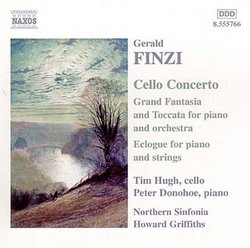 | Gerald Finzi, Howard Griffiths, Northern Sinfonia Chorus Finzi: Cello Concerto; Grand Fantasia & Toccata; Eclogue Genre: Classical
|
Larger Image |
CD DetailsSimilarly Requested CDs
|
CD ReviewsPastoral Lyricism - Good for the Soul Christopher Forbes | Brooklyn,, NY | 05/05/2003 (5 out of 5 stars) "Gerald Finzi seems to be coming into his own lately. He was a composer who I had never heard of during the 60s and 70s, though in the 80s he seemed to be more and more prevalent on the radio. The impression given by conventional musician's wisdom on the composer was that he was one of the last of the English pastoralists, too conservative to be even as interesting as Walton or Rubbra, just a passing blip on the the musical radar. But now the situation is much different. Chandos released several discs of Finzi orchestral material, and with this Naxos release, the composer should gain an even wider following. The major work on this disc is the Cello concerto. Written late in the composer's career, right after his diagnosis with cancer, the work is dramatic, unsettled and ultimately extremely beautiful. Finzi's musical language is backward looking...resembling nothing so much as the Elgar concerto, and every bit as worthy of becoming a repertory staple as that piece. The first movement is dramatic and tense, with marvelous virtuoso cello writing, especially in the cadenza. The second movement is a wonder...Finzi had a knack for heartbreakingly lyrical slow movements and this one is no exception. The work concludes with a triumphant finale in a polonaise rhythm. This is a tremendous work and now that the post-war stylistic fights are over, perhaps the work can get it's due as one of the strongest concertos for the cello of the 20th century. The second work on the disc is the Eclogue for Piano and Strings. Originally planned as the slow movement of a never finished piano concerto, this is my favorite work by the composer. It is reminiscent both of the slow movements to Bach's Keyboard concerti and to the Ravel Piano Concerto in G. The melodic lines form a slow, elegant arch, underpinned with simple but fresh harmonies. Each moment of the work is designed to break your heart, and if the piece doesn't, I seriously doubt you have a heart to break!The final work on the disc is the Grand Fantasia and Toccata for Piano and Orchestra, originally meant to be the finale of the unfinished piano concerto. This is a bravura work, showing Finzi in a mode much closer to Walton than the Elgarisms of the concerto and the Eclogue. Though I don't find this work as lovely as the other two, it is well crafted and enjoyable and would make a great pairing with the Eclogue on a concert program. Hats off to Naxos for once again making unfamiliar music accessible to everyone at a price that is hard to beat. If you like heartbreaking and melodic music, that is still fresh and original, I highly recommend this disc. It is unbeatable." Faith Restored Joshua Grasso | Oxford, OH USA | 02/07/2002 (5 out of 5 stars) "Naxos has a happy knack for re-discovering forgotten masterpieces of the orchestral & chamber repertoire, and this disc is no exception. In fact, it is one of the greatest testaments to their label's vision. Though I previously knew Finzi for his melodic Clarinet Concerto, the Cello Concerto made me re-evaluate the genius of his overshadowed talent. Written at the end of his life, it is easy to read into this masterpiece a world of valedictory meanings--unyielding fate, lost love, advancing age, visions of youth, etc. But ultimately what remains is the music, and what music! This is music of incredible endurance, hope, and love of humanity. At once defiant, triumphant, and gently melodic, it is a near cousin to Elgar's Concerto, but with such incredible feeling that it should enrich the cello repertoire for centuries to come. A major masterpiece by a minor master, Finzi's work will be a welcome addition to your collection--to say nothing of the other two pieces, both delightful, rewarding works firmly in the Finzi tradition. Some days all it takes is some good music to re-affirm your faith in humanity. This does the trick." It really doesn't get much better than this Joshua Kaufman | Cincinnati, OH | 01/08/2003 (5 out of 5 stars) "I don't know why, but Finzi is not a composer who is very well known. Known probably more for his choral music and songs, he wrote what I consider some of the finest post-romantic music out there. This disc contains three wonderful pieces of music that I cannot get enough of.
The Cello Concerto is a highly passionate work, some of his most 'modern' music (it's still very tonal). Tim Hugh gives a wonderful performance, and if it weren't for Shostakovich I might say this is the best cello work of the 20th century. But even a wonderful work like the Cello Concerto doesn't even compare to the Eclogue for Piano and Strings. I don't know if I can write with words how much I love this piece -- it's pure romance all the way, with a wonderful melody that just grabs you and never lets go. If you like Rachmoninoff, you will absolutely love this piece, I guarentee it. The Grand Fantasia and Toccata, is a spiffy piece, that while isn't quite up to the level of the other two is still very nice. It's much more of a showpiece than anything, and the finale comes off big and fast like any good showpice. Again, I can't recommend this disc enough. Wonderful music, wonderful performance, all at a nice price -- what more could you ask?" |

 Track Listings (5) - Disc #1
Track Listings (5) - Disc #1